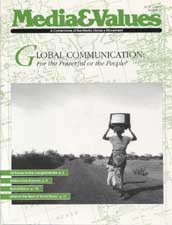Guidelines for Process Reporting
|
This article originally appeared in Issue# 61
|
By Phil Harris
Development-oriented journalism need not always accentuate the positive, says communication director Phil Harris, director of training and communication studies, InterPress Service (IPS), but it shouldn't accentuate the negative either.
"Coverage of human-interest development reveals the reality of rural life, the grime, the injustice, the squalor as well as the success stories.
"Development journalists have often been told: don't touch coups, earthquakes and disasters," because such negative stories are the territory of event-oriented Northern hemisphere wire services.
"This is nonsense. Coups have to be touched-better still, predicted. The task of the journalist should be to report the processes, the common citizen's gripes which feed the collective national frustrations that periodically erupt in military mutinies. Development reporting is also writing about earthquakes and floods and typhoons, kneeling down to the human level of the tragedies-the casualty patterns of floods in Bangladesh that wash away the landless who settled in danger zones because they had nowhere else to live, or the deadly landslides in Nepal caused by tree-cutting higher up in the mountains.
"Development is about change. People, societies, value systems and even landscapes evolve. The small things have to be woven into a larger pattern. As snakes disappear, so do the charmers."
As communications director of the International Press Service, a worldwide alternative news service, Harris recommends what he calls "process-oriented reporting" in which precedence is given not so much to events in themselves as to the chain of situations which precedes and follows (and thus helps explain) them.
The IPS style involves a conscious effort to avoid the sensationalism and negativism that marks much traditional reporting of Third World issues. But that doesn't mean that problems are ignored.
He advises journalists interested in going beyond the traditional superficial reporting of projects and developments to visit sites, talk with officials, go through evaluation reports "and, above all, listen to the people whom the projects are intended to benefit."
Questions for readers and listeners who want to evaluate  the reporting they see and hear include:
the reporting they see and hear include:
- Are the basic physical needs of the people involved being met?
- Are their social, cultural, political and intellectual rights being protected? (Especially the rights and needs of women, children and minorities.)
- Are agricultural, industrial and other activities carried on in such a way as to ensure a liveable physical and economic environment for future generations (sustainable development).
These questions may seem abstract, but they involve such basic issues as how the starving feed themselves when aid programs end, how refugees will be cared for and where they will go when the war is over, how relocated villagers will adjust to urban life and its pressures and how to promote feasible alternatives to deforestation and environmental destruction.
From a paper presented by Phil Harris at the Youth for Development and Cooperation Conference, London, January 1992. Development reporting suggestions adapted from Against All Odds: Breaking the Poverty Trap, Panos Institute.



